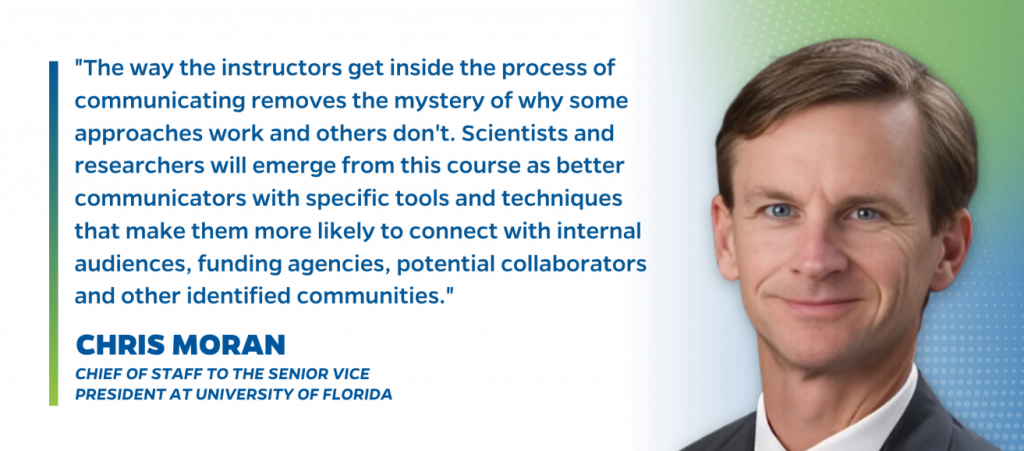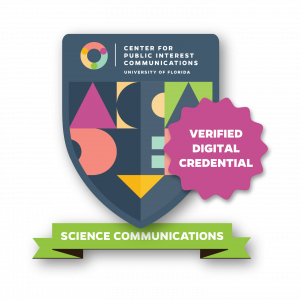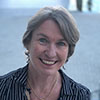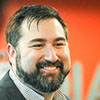Science Communications Course
Ready to talk about your work? Sign up for our science communications course
- Gain skills and understanding to communicate your research beyond the lab
- Build trust and credibility
- Foster public understanding
- Address misinformation
- Establish influence in your field
UF EMPLOYEES:
NON-UF EMPLOYEES:

Join Us and Develop Your Skills
Communication is vital to the scientific process. Our online Science Communication course is designed to equip you with the essential skills to convey your research to diverse audiences confidently. Learn to take a narrative approach to your outreach work and apply evidence-based communications strategies. Discover a cognitive approach to data visualization, uncover your stories, prepare and deliver presentations with purpose and learn how to work with journalists and policymakers.
The course is open to all scientists, researchers, science communicators, healthcare professionals or anyone wishing to improve their external science communications. Sessions are 3-hours long and take place live and online every other week over the fall semester.
Don’t miss this opportunity to elevate your science communication game and inspire positive change. Enroll in our online Science Communication course today and become a confident, strategic and influential communicator.
Who should take this course:
Scientists, researchers, lab members, post-docs, health care professionals, science communicators, and anyone wishing to improve their external science communications
Skills you will learn include:
- Convey research to people with different expertise
- Present with confidence and pride
- Share data through visualizations that are memorable, compelling and credible
- Use stories to increase understanding and recall
- Create a summary of your research and incorporate story
- Understand how to connect with and learn from people who can benefit from your research
- Learn to work with journalists to help them report accurately on your work
- Learn to build your influence with potential collaborators, funders, journalists and others
- Communicate to overcome uncertainty and misinformation
Earn your digital credential

After successfully completing the course, you will earn a verified digital credential for the Center for Public Interest Communications. Credentials provide peers and employers concrete evidence of what you had to do to earn your credential and the skills you’ve acquired. Attendance for all sessions is required to earn the digital credential in Science Communications at the end of this course. If you have an unexcused absence, you can still complete the course but will not receive the credential.
2025 Program Schedule
Program participants will meet online in person twice monthly.
| SESSION TOPICS | DATE/TIME (Time is in ET) |
| The science of communicating about science Building support for your work starts with helping others understand it. In this session, you’ll learn the six building blocks of communicating effectively about complex and abstract ideas. |
5/27– 9:30 a.m. to 12:30 p.m. |
| Strategy for science Connecting with funders, journalists and collaborators can feel overwhelming and distracting. In this session, you’ll learn to concentrate your efforts where they can have the greatest effect. |
6/10 – 9:30 a.m. to 12:30 p.m. |
| Science of story Stories are the best tools we have for helping people understand and remember complex ideas. In this session, you’ll learn the seven elements of stories that build understanding and inspire others to act. |
6/24– 9:30 a.m. to 12:30 p.m. |
| Presenting with purpose Learn the secrets to creating and delivering compelling presentations. |
7/8- 9:30 a.m. to 12:30 p.m. |
| The essential rules of effective data visualization Data is fundamentally abstract and challenging for the human mind to comprehend. In this session, we’ll share science-based principles for sharing data and developing visualizations that help others comprehend your work. |
7/22– 9:30 a.m. to 12:30 p.m. |
| Building your influence Build your reach and credibility with journalists, policymakers and funders. Learn to work with the media, navigate a conference, and increase public scholarship. |
7/29– 9:30 a.m. to 12:30 p.m. |
| Graduation Online meetup to share stories and celebrate successful course completion |
7/29 12:30 pm |
Eligibility
- All researchers, scientists, healthcare professionals, science communicators
- UF Applicants must have support from their supervisors
NON-UF EMPLOYEES:
Program Faculty
The Science Communications course is led by faculty and staff in the Center of Public Interest Communications in the College of Journalism and Communications. The team have deep expertise in research, strategy, pedagogy and media, and sessions will be driven by recent insights from psychology, sociology, and communications scholarship. The team also has substantial experience in live online teaching and incorporates important active learning methods to enhance the program.

Ann Christiano, MPAP
Director, Center for Public Interest Communications; Clinical Professor in the Public Relations department at the University of Florida’s College of Journalism and Communication

Ellen Nodine, MAE
Director of Programs and Training, Center for Public Interest Communications, College of Journalism and Communications

Matt Sheehan, MBA
Managing Director, Center for Public Interest Communications and Journalism Faculty at the College of Journalism and Communications
NON-UF EMPLOYEES:
“The course provided me with a structured framework for sharing my research with stakeholders, such as older adults, their caregivers, academic colleagues, industrial partners, and policymakers, and opportunities to learn from each other in our cohort. I have already applied what I learned to three presentations: one for community engagement, one for science conferences, and one for public advocacy. Such a valuable and great journey!”
Hongwu Wang, UF Assistant Professor And Director, Technology For Occupational Performance (TOP) Lab
Program Cost
The UF rate for the six sessions is $1,395. All materials and facilitation fees are included. The fee will not be refunded once you have been accepted to the program and attend the first session. If three or more people from one department enroll, there will be a $250 discount on each registration or you can get a $150 discount if a course alumnus recommends you.
The Non-UF rate for the six sessions is $1,575. Sign up before April 15 and take $200 off with the code: SciCom25
Registration is available through the Destiny One Portal.
Contact
If you have questions about the Science Communications Course, please contact:
Ellen Nodine, M.A.E.
Director of Programs and Training, Center for Public Interest Communications, College of Journalism and Communications
352-273-1098 | enodine@jou.ufl.edu